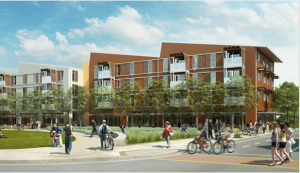University of California, Davis is striving to become a zero net energy campus. The first development will be the UC Davis West Village. The development will combine advanced energy efficient design features that include a 4 megawatt (MW) SunPower solar power system. The solar system, comprised of both rooftop and solar canopies installed in parking areas, will generate the equivalent of 100 percent of the community’s electricity demand. Once complete this fall, this is expected to be the largest zero net energy development in in the country. The project is the result of a public-private partnership between UC Davis and West Village Community Partnership, a joint venture between San Francisco-based Carmel Partners and Urban Villages of Denver.
“I applaud UC Davis, SunPower Corporation, Carmel Partners, and the CEC [California Energy Commission] for their collaboration, dedication, and leadership in developing the largest zero net energy project in the United States,” said Lieutenant Governor Gavin Newsom. “This is a demonstration of California’s excellence in sustainability, and should set an example for the rest of the nation.”
 The first phase of the 130-acre project will include apartment housing for 2,000 students, an education center for Los Rios Community College, recreation and study facilities, a village square surrounded by neighborhood-serving retail, and 343 single family homes for sale to faculty and staff. Students will be welcome beginning with the fall semester for two student housing components of the community, The Ramble Apartments and Viridian.
The first phase of the 130-acre project will include apartment housing for 2,000 students, an education center for Los Rios Community College, recreation and study facilities, a village square surrounded by neighborhood-serving retail, and 343 single family homes for sale to faculty and staff. Students will be welcome beginning with the fall semester for two student housing components of the community, The Ramble Apartments and Viridian.
“West Village is a paradigm shift in creating both a great place to live and a model Zero Net Energy community,” said Nolan Zail, senior vice president for Carmel Partners. “Using aggressive energy efficiency measures and on-site renewable energy generation to meet community energy demand, this holistic approach offers new solutions in the design and construction of large-scale sustainable communities,” Zail added.
The UC Davis West Village will integrate sustainable design enabling those living in the community to reduce their reliance on automobiles, limit energy consumption and enjoy the benefits of the local climate. Building designs optimize solar orientation, utilize energy efficient appliances and incorporate materials from renewable sources. Increased efficiencies will be achieved by providing UC Davis West Village residents with tools to enhance control of their own energy use, including programmable energy management systems and SunPower monitoring, which provides information on solar system power generation and electricity usage.

